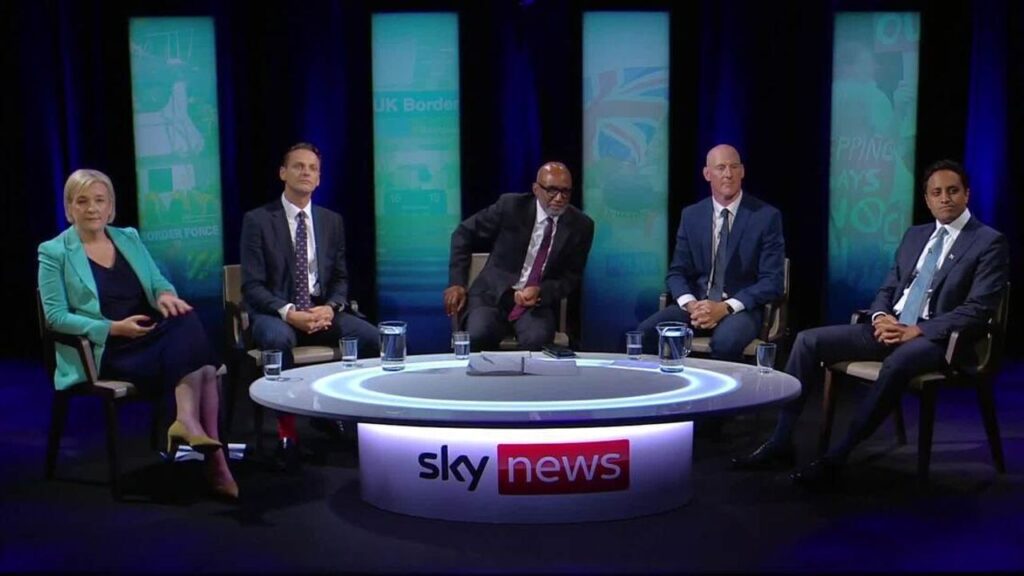The issue of immigration has ceased being simply policy. It’s now been manipulated to become a marker of who you are, what you fear, whether you trust politicians. In a debate hosted by Sky News this week, representatives from Labour, the Conservative Party, the Liberal Democrats and Reform UK all took the stage to discuss and debate this contentious issue. But did any parties fully earn their vote of confidence from the public?
To begin, Mike Tapp, newly sworn in as Labour’s immigration minister, insisted the government is “going further and faster” on border security, with more deportations, more cooperation with France, new detention and removal deals, as well as immigration hotels to be ditched in favour of using Ministry of Defence sites. However, Tapp failed to answer the central question of how this differs from what came before. Rather, it seems to be a déjà vu of policies under previous administrations, dressed as a façade of new promise. Meanwhile, crossings are rising; hotels are still full. The public sees the government rhetoric, that certainly is there, but little change is truly to be observed.
On the contrary, Kieran Mullan from the Conservative Party owned up to failure, admitting that his party was “too slow” and that legal migration was mishandled. Regarding policy, Mullan suggested that if a Conservative government was to emerge at the next election, they would demand more from applicants, such as longer residency before settlement, tougher income thresholds, and deciding to disapply the Human Rights Act for immigration claims. Then again, if this ambition is real, why didn’t the Conservative Party attempt to introduce these policies when they had the power to do so?
Lisa Smart of the Lib Dems attempted to position herself as the voice of reason, arguing that immigration can still be framed as a benefit, for staffing the NHS and for cultural enrichment. But she didn’t sugarcoat the costs either, referring to the likely asylum backlogs, the use of hotels, and community tension that high levels of immigration have, and will continue to, cause. Throughout her argument, Brexit was implied to have been the main cause of this crisis, due to the dismantling of EU return systems, which led to legal limbo for many attempting to migrate. To rectify these issues, Smart proposed ideas of safer routes, international cooperation and speedier processing, all of which theoretically are appealing, yet would likely be a struggle to implement practically. Once again, the Lib Dems failed to offer any true resolution to this crisis, as has come to be expected of the party of moderation.
Finally, Zia Yusuf of Reform UK failed to provide any notable insight into the crisis, stating Britain is overwhelmed, a fact that the rest of the United Kingdom already are aware of. His “Operation Restoring Justice” promises mass deportations, naval interception of boats, and deporting those in the country illegally. But such sweeping promises spark scepticism, for logistically, legally, morally, how can any party detain mass numbers yet still obey international law? Yusuf’s performance solely solidified the idea that Reform produce populist sound bites rather than real, workable policy ideas. In a tweet later, Nigel Farage referred to immigration as a “national security emergency,” because there are “more Channel migrants in the UK than we have active military personnel,” yet the Reform leader declined to provide any real solutions to rectifying the emergency.
What emerged, however, was consensus on one point: that the current system is failing. All four parties admitted that, agreeing that deterrence is necessary. But that agreement is shallow, for each party has a starkly divergent idea of deterrence. Unfortunately for the electorate, these ideas are not compatible.
Interestingly, partisan contrast between appearance and authenticity was exemplified greatly in this debate, with Tapp and Mullan attempting to convey a façade of seriousness, yet failing with their repeated ideas that neither party implemented when they had the opportunity in government. On the other hand, Reform attempted to give no illusion of nuance, but, at least in the eyes of their supporters, that is its strength. But none managed to provide any proof that their policies will be transformative.
Overall, what’s at stake is trust, for when voters demand “something must be done,” they expect clarity, not platitudes. When politicians promise “further and faster,” the public expects to see boats stopped, asylum backlogs cut, and infrastructure protected. But when jobs, services, and local life are under pressure, the people feel policy inaction. And, after all, the will of the people is what decides who is allowed to govern. The wishes of the people must be obeyed.
Faux hard-lines, dramatic promises, naval flotillas might sell in headlines. But what Britain needs is detail on how illegal immigrants will be removed and returned, what legal obstacles there are, and what cost this will have for taxpayers. Without that detail, their words are reduced solely to political appeasement. Is there much hope for the immigration crisis to be resolved? This debate rather suggests there shouldn’t be any.
Picture by Sky News

